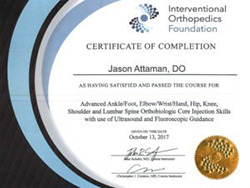If you suffer from thoracic outlet syndrome – an unusual cause of arm and shoulder pain and weakness – Dr. Jason Attaman can help. Located in Bellevue, WA, Dr. Attaman treats patients throughout the Seattle area, sees patients who fly in for treatment, and provides telemed appointments where appropriate. You can call us at 425-247-3359, email us, schedule an appointment with Dr. Attaman online, or you can read on to learn more about thoracic outlet syndrome and possible treatment.
What Is Thoracic Outlet Syndrome?
Thoracic outlet syndrome is a rare condition, but it can cause considerable pain. Your thoracic outlet is a point between your neck and shoulder that allows the nerves to pass into your arm, hand, and fingers. When a patient has thoracic outlet syndrome, these nerves become compressed, resulting in pain, weakness, and numbness in the arm, shoulder, and hand.
However, thoracic outlet syndrome is often misdiagnosed. Most doctors have not encountered TOS and presume that the pain is caused by another condition that the patient may or may not have. There are several other conditions that can refer pain in the same way, including ligament sprains and problems with the rotator cuff. Herniated, slipped, or degenerated discs in the cervical and thoracic spine can also mimic thoracic outlet syndrome. Most people with TOS are incorrectly diagnosed with these more-common conditions and find little relief.
Dr. Attaman is very familiar with thoracic outlet syndrome as well as the conditions that TOS is often mistaken for. If you have thoracic outlet syndrome, Dr. Attaman can perform diagnostic injections into the muscles that trap the nerves involved in thoracic outlet. This is called an anterior and middle scalene and pectoralis muscle block. This is the gold standard to diagnose thoracic outlet syndrome. If that provides significant but short-term benefit, he can also use an injection to relax the muscles’ painful grip on the irritated nerves. Dr. Attaman is also very experienced in using healing injections, including prolotherapy, to repair those tissues.
If you have thoracic outlet syndrome and wish to avoid surgery, Dr. Attaman can help.
As symptoms grow more severe, thoracic outlet syndrome can be debilitating indeed. The pain, tingling, and numbness you may be experiencing in your hands or arms can make it difficult to carry out almost any activity of your daily life, from cooking a meal to working at your job.
How often does thoracic outlet syndrome get misdiagnosed?
Often patients wait months, if not years, to get an accurate diagnosis. Thoracic outlet syndrome often presents as other problems. That can lead to unsuccessful treatments. Many who come to us first recognize the problem after reading about it online, rather than from being diagnosed by their PCP.
Because we deal with thoracic outlet syndrome every week, we know how to identify it and treat it correctly. If it turns out that there’s some other pain condition affecting you, there’s still a good chance we’ll be able to help you with that one, too.
How long does it take for thoracic outlet syndrome to go away?
Without some form of treatment, thoracic outlet syndrome will not go away.
With treatment, the outcome depends on the treatment you receive. Nerve blockers can relieve TOS symptoms immediately.
What are some conditions related to thoracic outlet syndrome?
Any nerve entrapment issue is related to thoracic outlet syndrome.
Conditions that mimic thoracic outlet syndrome include angina, rotator cuff injuries, fibromyalgia, cervical disc disorders, multiple sclerosis, and tumors.
What are the complications of thoracic outlet syndrome?
As the disease progresses, it can lead to the formation of serious blood clots, gangrene, ischemic ulcers, and a host of other nasty complications.
If you have been diagnosed with a condition that mimics thoracic outlet syndrome and you’re still not getting relief, contact us. We can help you avoid all of these severe negative consequences.
What should you avoid with thoracic outlet syndrome?
You should avoid repetitive movements and lifting heavy objects. Avoiding carrying heavy bags over your shoulder, such as purses or backpacks, is also important.
What treatment options exist for thoracic outlet syndrome?
Four treatment options exist. The first is usually physical therapy, which can be effective for some patients. Some doctors will turn to injectables or surgery if that doesn’t work.
Most doctors are not integrated pain management doctors. Muscle relaxant injections and nerve blocker injections can be exceptionally effective in helping to treat this condition.
Contact Dr. Attaman’s office in Bellevue WA for help diagnosing and treating thoracic outlet syndrome
Contact us to make an appointment if you’ve been diagnosed with thoracic outlet syndrome, or strongly suspect that you have it. We’ll advise you on whether or not we can help, and we’ll be able to help you choose the best treatment plan for the source of your pain.
